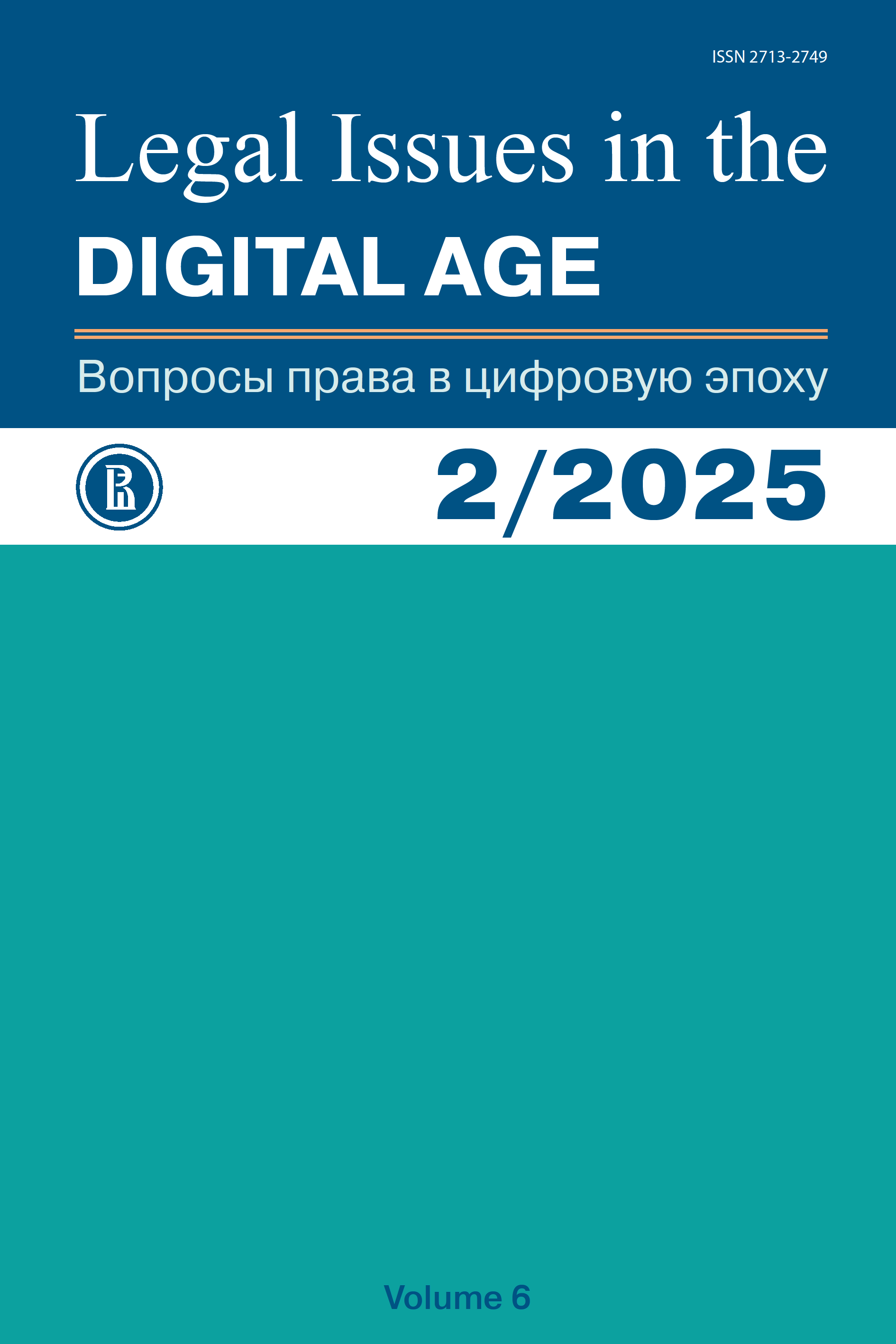Shaping Artificial Intelligence Regulatory Model: International and Domestic Experience
Аннотация
The article contains an analysis of AI regulatory models in Russia and other countries. The authors discuss key regulatory trends, principles and mechanisms with a special focus on balancing the incentives for technological development and the minimization of AI-related risks. The attention is centered on three principal approaches: “soft law”, experimental legal regimes (ELR) and technical regulation. The methodology of research covers a comparative legal analysis of AI-related strategic documents and legislative initiatives such as the national strategies approved by the U.S., China, India, United Kingdom, Germany and Canada, as well as regulations and codes of conduct. The authors also explore domestic experience including the 2030 National AI Development Strategy and the AI Code of Conduct as well as the use of ELR under the Federal Law “On Experimental Legal Regimes for Digital Innovation in the Russian Federation”. The main conclusions can be summed up as follows. A vast majority of countries including Russian Federation has opted for “soft law” (codes of conduct, declarations) that provides a flexible regulation by avoiding excessive administrative barriers. Experimental legal regimes are crucial for validating AI applications by allowing to test technologies in a controlled environment. In Russia ELR are widely used in transportation, health and logistics. Technical regulation including standardization is helpful to foster security and confidence in AI. The article notes widespread development of national and international standards in this field. Special regulation (along the lines of the European Union AI Act) still has not become widespread. A draft law based on the risk-oriented approach is currently discussed in Russia. The authors of the article argue for the gradual, iterative development of legal framework for AI to avoid rigid regulatory barriers emerging too prematurely. They also note the importance of international cooperation and adaptation of the best practices to shape an efficient regulatory system.
Литература
Antonova L.I., Korneva K.A. (2022) On Soft Law and Self-Regulation in the Codes of Ethics for Artificial Intelligence. Knowledge, vol. 4, pp. 34–38 (in Russ.)
Arzamasov Yu. G. (2023) Optimal Model of Legal Regulation in the Field of Artificial Intelligence. Vestnik Voronezhskogo gosydarstvennogo universiteta. Pravo=Bulletin of Voronezh State University. Law, no. 2, pp. 133–148 (in Russ.)
Baturin Yu. M., Polubinskaya S.V. (2022) Artificial Intelligence: Legal Status or Legal Regime? Gosudarstvo i pravo=State and Law, no. 10, pp. 141–154.
Bourcier D. (2001) De L’intelligence Artificielle a la Personne Virtuelle: Émérgence D’une Entité Juridique? Droit et société, vol. 3, pp. 847–871.
Ibragimov R. S., Suragina E. D., Churilova D.Y. (2021) Ethics and AI Regulation. Zakon=Law, vol. 8, pp. 85–95 (in Russ.)
Kashkin S. Y. (2021) The Philosophical, Moral and Ethical Foundations of Soft Law as The Initial Stage of Legal Regulation of Artificial Intelligence. Moscow: Prospekt, pp. 184–198 (in Russ.)
Khabrieva T.Y., Chernogor N.N. (2018) The Law in the Conditions of Digital Reality. Zhurnal rossiyskogo prava=Journal of Russian Law, no. 1, pp. 85–102 (in Russ.)
Kharitonova Y.S., Savina V.S. (2020) Artificial Intelligence Technology and Law: Challenges of Our Time. Vestnik Permskogo gosudarstvnnogo universiteta. Juridicheskie nauki=Perm State University Herald. Juridical Sciences, vol. 49, pp. 524–549. (in Russ.)
Kosykh A.A. (2021) The Artificial Intelligence Law in Law System: Branch of Law or Law Institution? Vestnik Vladimirskogo gosudarstvennogo juridicheskogo instituta=Bulletin of Vladimir State Law Institute, vol. 1, pp. 159–164 (in Russ.)
Minbaleev A.V. (2022) The Concept of “Artificial Intelligence” in Law. Vestnik Udmurtskogo gosudarstvennogo universiteta. Seria Ekonomika i pravo=Bulletin of Udmurt State University. Series Economics and Law, vol. 6, pp. 1094–1099 (in Russ.)
Mishina N.V. (2020) Artificial Intelligence Law as a New Area of Legal Regulation or a New Branch of Law. Evraziyskiy souiz ychenykh=Eurasian Union of Scientists, vol. 5, pp. 62–65 (in Russ.)
Polyakova T.A., Kamalova G.G. (2021) «Law of Artificial Intelligence» and its Place in the System of Information Law. Pravovoe gosudarstvo: theoria i praktika=The Rule of Law State: Theory and Practice, no. 33, pp. 133–145 (in Russ.)
Popova A.V. (2021) Soft Law as a Structural Part of the Complex Branch of Russian Legislation in the Field of Legal Regulation of Artificial Intelligence. Zhurnal Moskovsogo gosudarstvennyogo pedagogisheskogo unuversiteta. Ekonomiseskie issledovania=Moscow State Pedagogical University Journal of Economic Studies, no. 4, pp. 86–93 (in Russ.)
Sucharev A.N. (2021) Prospects of Legal Regulation of the Use of Artificial Intelligence in the Russian Federation. Vestnik Tverskogo gosudarstvennogo universiteta. Yuridicheskie nauki=Tver State University Herald. Juridical Sciences, no. 3, pp. 13–21 (in Russ.)
Talapina E.V. (2020) Algorithms and Artificial Intelligence in the Human Rights Context. Zhurnal rossiyskogo prava=Journal of Russian Law, no. 10, pp. 25–39. (in Russ.)
Copyright (c) 2025 Buriaga V.O., Djuzhoma V.V., Artemenko E.A.

Это произведение доступно по лицензии Creative Commons «Attribution-ShareAlike» («Атрибуция — На тех же условиях») 4.0 Всемирная.
Авторы, присылающие рукописи для рассмотрения к публикации в Журнале, принимают Политику лицензирования, авторских прав, открытого доступа и использования репозиториев.







